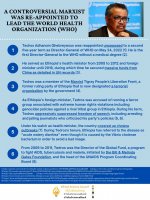Far-Reaching US Amendments to WHO Regulations, Global Pandemic Treaty Raise Concerns: Journalist
Far-Reaching US Amendments to WHO Regulations, Global Pandemic Treaty Raise Concerns: Journalist
U.S.-proposed amendments to the international health regulations which govern response to pandemics and the new global pandemic treaty, both on the agenda of the World Health Organization’s general meeting, pose a threat to countries’ sovereignty, said journalist and author Nick Corbishley.
The amendments proposed in January by the Biden administration will give the Director-General of the World Health Organization (WHO) unilateral authority to declare a public health emergency in any nation based on whatever evidence the director chooses.
The 13 amendments put forward by the Biden administration were on the agenda of the 75th World Health Assembly held last week in Geneva, Switzerland. The World Health Assembly is the decision-making body of the WHO and is attended by delegations from all member states, according to the organization’s website.
The global pandemic treaty is a parallel mechanism of the WHO. It will have force under international law and is very similar to the International Health Regulations’ amendments, but it will give far more power to the WHO and its director-general, Bell said.
Currently, the WHO “only has an advisory role. It’s only able to make recommendations to member states and it is up to the participating nations to decide whether and how they implement those recommendations,” Corbishley explained. “That is likely to change if there is a global pandemic treaty. ”
Corbishley believes that the assembly will focus more on compliance of WHO member states with regulations adopted by the organization. The Biden administration mentioned setting up a compliance committee that will ensure that WHO participants follow its regulations, Corbishley told EpochTV’s “Crossroads” program.
He pointed out that the concept of a compliance committee if implemented, will be “almost like to police the actions of each member state.



